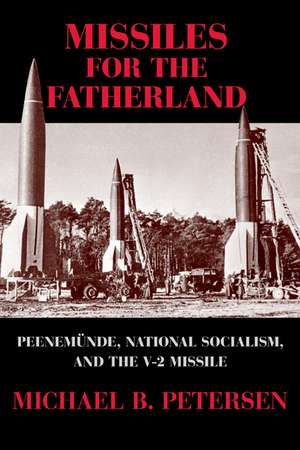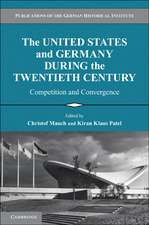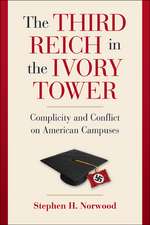Missiles for the Fatherland: Peenemünde, National Socialism, and the V-2 Missile: Cambridge Centennial of Flight
Autor Michael B. Petersenen Limba Engleză Paperback – 15 iun 2011
| Toate formatele și edițiile | Preț | Express |
|---|---|---|
| Paperback (1) | 292.96 lei 6-8 săpt. | |
| Cambridge University Press – 15 iun 2011 | 292.96 lei 6-8 săpt. | |
| Hardback (1) | 694.23 lei 6-8 săpt. | |
| Cambridge University Press – feb 2009 | 694.23 lei 6-8 săpt. |
Preț: 292.96 lei
Nou
Puncte Express: 439
Preț estimativ în valută:
56.07€ • 58.38$ • 47.38£
56.07€ • 58.38$ • 47.38£
Carte tipărită la comandă
Livrare economică 08-22 martie
Preluare comenzi: 021 569.72.76
Specificații
ISBN-13: 9780521283403
ISBN-10: 052128340X
Pagini: 290
Dimensiuni: 152 x 229 x 17 mm
Greutate: 0.43 kg
Editura: Cambridge University Press
Colecția Cambridge University Press
Seria Cambridge Centennial of Flight
Locul publicării:New York, United States
ISBN-10: 052128340X
Pagini: 290
Dimensiuni: 152 x 229 x 17 mm
Greutate: 0.43 kg
Editura: Cambridge University Press
Colecția Cambridge University Press
Seria Cambridge Centennial of Flight
Locul publicării:New York, United States
Cuprins
1. Help build the spaceship!; 2. At Peenemunde, they have created a paradise; 3. It was a fantastic life!; 4. Production by convicts: no objections; 5. At the limits of existence; 6. We still had a fatherland to fight for; 7. Engineering consent at Peenemunde.
Recenzii
Review of the hardback: 'Michael Petersen offers a new and disturbing account of the German missile community under the Nazis at the clandestine Peenemünde facility that developed the V-2 rocket. These were not apolitical engineers blithely lost in mathematical equations and dreams of space travel, but astute professionals dedicated to destroying Germany's enemies while serving their own careers. Worse, the missile team's privileged status, comfortable living conditions, cloak of secrecy, and sense of national mission fostered knowing complicity in the crimes of the regime they served - crimes with which they and their work shall always be associated. An essential look at the perilous relationship between science and dictatorship.' Norman J. W. Goda, author of Tales from Spandau: Nazi Criminals and the Cold War, Cambridge University Press, 2006
Review of the hardback: 'Michael Petersen's Missiles for the Fatherland is an important study of the co-optation and seduction of engineers and scientists by the Nazi regime. He demolishes once-and-for-all the myth that the Peenemünde rocket engineers were apolitical technocrats more interested in going into space than building weapons. He demonstrates the intimate connection between their technical work, carried out in deepest secrecy, and the murderous exploitation of concentration-camp workers in the V-2 production program.' Michael J. Neufeld, National Air and Space Museum, Smithsonian Institution
Review of the hardback: 'This book examines an important and fairly well studied subject from a different perspective by providing an anthropological and sociological study of the German rocket engineers. The social context and environment of the German rocket R & D effort in Peenemünde and elsewhere had a decisive influence on the rocket engineers and scientists and encouraged them to work on new weapons in what became a Faustian Pact with Hitler's regime. There was not that much difference between the production engineers supplied by the Armaments Ministry and the SS and the staff at Peenemünde when it came to slave labor and other issues. The Peenemünders' obsession with secrecy dovetailed with the goals and methods of the SS, and their conviction that the survival of the German nation depended on the rockets they were building diminished their concern for other groups (like POWs and concentration camp prisoners).' Mark Walker, Union College
'Peterson's sophisticated analysis is well written and belongs in every World War II library.' Central European History
Review of the hardback: 'Michael Petersen's Missiles for the Fatherland is an important study of the co-optation and seduction of engineers and scientists by the Nazi regime. He demolishes once-and-for-all the myth that the Peenemünde rocket engineers were apolitical technocrats more interested in going into space than building weapons. He demonstrates the intimate connection between their technical work, carried out in deepest secrecy, and the murderous exploitation of concentration-camp workers in the V-2 production program.' Michael J. Neufeld, National Air and Space Museum, Smithsonian Institution
Review of the hardback: 'This book examines an important and fairly well studied subject from a different perspective by providing an anthropological and sociological study of the German rocket engineers. The social context and environment of the German rocket R & D effort in Peenemünde and elsewhere had a decisive influence on the rocket engineers and scientists and encouraged them to work on new weapons in what became a Faustian Pact with Hitler's regime. There was not that much difference between the production engineers supplied by the Armaments Ministry and the SS and the staff at Peenemünde when it came to slave labor and other issues. The Peenemünders' obsession with secrecy dovetailed with the goals and methods of the SS, and their conviction that the survival of the German nation depended on the rockets they were building diminished their concern for other groups (like POWs and concentration camp prisoners).' Mark Walker, Union College
'Peterson's sophisticated analysis is well written and belongs in every World War II library.' Central European History
Descriere
A scholarly investigation of the culture underpinning missile development at Germany's secret missile base at Peenemünde.

















